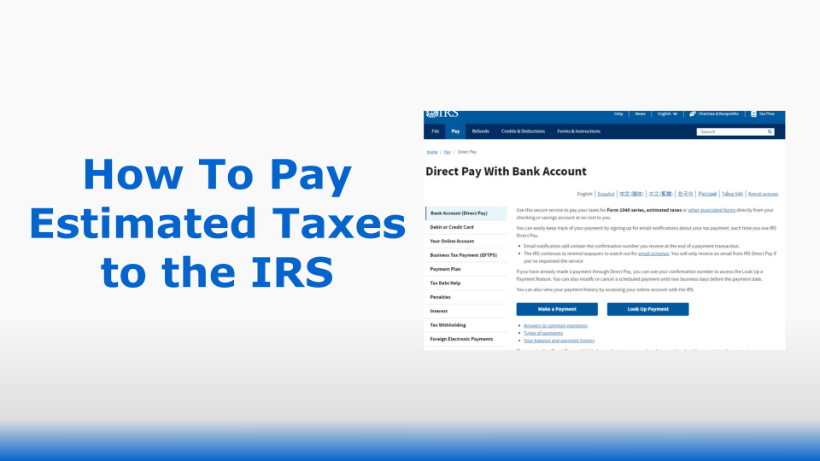Tips for Filing a Late Tax Return
Published:
File Your Past Due Tax Return to Avoid Further Penalties
It is recommended that you file any tax returns that are due, whether or not you can pay your tax liability in full. The longer you wait to file, the higher your late fees and interest charges will be.
You can file a late tax return the same way you would file an on-time tax return, by paper or online through an Approved IRS e-file Provider.
If You Fail to File
Filing a tax return on time is always your best option. There are numerous problems that can arise if you fail to file a timely Federal income tax return, including the following:
If you don’t file at all, you risk losing out on a tax credit or tax refund. To claim your refund or certain tax credits (such as the Earned Income Tax Credit) you must file your tax return within 3 years of its due date, including extensions. In cases where one or more tax returns are past due, the IRS will hold onto the refunds until the late return(s) are filed, or until you provide an acceptable reason for not filing on time.
If you are self-employed and fail to file a Federal tax return, your self-employment income will not be reported to the Social Security Administration, which means you will not get credits toward Social Security benefits.
When you neglect to file a tax return, you risk delaying other necessary financial transactions. For example, copies of filed tax returns must be submitted to buy or refinance a home, acquire a business loan, or apply for Federal student aid.
By not filing your tax return, you risk having the IRS prepare a substitute return for you. A substitute return will rarely be prepared to your advantage because it will not include any tax exemptions, tax deductions, or credits that you are entitled to claim. You will then receive a Notice of Deficiency CP3219N (90-day letter) notifying you of the proposed tax assessment. In response, you will have 90 days to file your own return or file a petition in United States Tax Court. No tax extension is allowed in this circumstance, and after 90 days you will receive a tax bill, which will go to IRS Collection if it is not paid.
Minimize the Penalties
If you are unable to file a timely return, there are still things you can do to minimize the damage.
To start, it is always best to file your tax returns by the proper deadline, whether or not you can pay the tax due in full. This will help limit the interest charges and penalties. Note that you will owe interest on any tax amount that isn’t paid by the April 15 deadline, which will continue to accrue until the tax is paid. Therefore, you should try to pay as much as you can as soon as possible.
If you cannot pay your taxes due, you can request an additional 60–120 days to fully pay your tax liability through an Online Payment Agreement Application or by calling the IRS at 1-800-829-1040. If you need to request extra time to pay, you can look into setting up an “Installment Agreement” or an “Offer in Compromise.”
RELATED: IRS Tax Debt Relief Options
Tax Tips for Filing a Late Return
Here are some general tips and information to assist you in filing a late tax return with the IRS:
If you need income information to prepare your past due return, call the IRS at 1-800-829-1040, or contact your employer.
To obtain copies of your W-2s, 1099s, 1098s, etc., that have been reported to the IRS, go to the “Get Transcript” page of the IRS website and select “Wage and Income Transcripts.”
You can request an automatic 6-month tax extension by filing IRS Form 4868 (and paying any tax due) by the original deadline, April 15. Remember that an extension only gives you more time to file, it does not give you more time to pay. There are no further extensions allowed, unless you are living outside the country or actively serving in the U.S. Armed Forces, in which case you may be eligible for an additional 2-month extension.
If you fail to pay on time, a Late Payment Penalty is assessed at a rate of 0.5% of the unpaid taxes. It is charged for each month, or part of a month, that the tax goes unpaid — up to a maximum penalty of 25% of your unpaid taxes. If you can show reasonable cause for not paying on time, the late payment penalty may be waived. Attach a statement to your tax return (IRS Form 1040) fully explaining the reason you failed to pay.
If you fail to file on time, a Late Filing Penalty will be charged at a rate of 5% of the unpaid tax. It is charged each month, or part of a month, that your return is past due — up to a maximum penalty of 25% of your unpaid taxes. If your return is more than 60 days late, the minimum penalty is $135 or 100% of the tax due on your return, whichever is smaller.
It may be possible for you to convince the IRS to reduce or waive a penalty, for either late filing or late payment, by showing you had reasonable cause for missing the deadline. For instance, you must be able to prove that bad health, a family emergency, or a natural disaster prevented you from filing your taxes on time. This type of request is generally fact-sensitive and must be supported by proper documentation.
RELATED: How to Amend Your Federal Tax Return If You Made a Mistake



